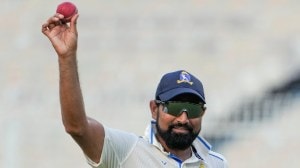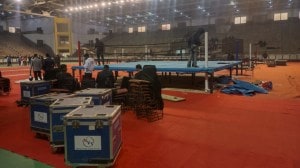Tacking municipal waste a grave challenge 8212; Tyagi
NAGPUR, JUNE 6: Tackling municipal waste is the most challenging job as far as environment management in the country is concerned, Partito...

NAGPUR, JUNE 6: Tackling municipal waste is the most challenging job as far as environment management in the country is concerned, Partitosh Tyagi, former chairman of Central Pollution Control Board and an eminent environmental consultant, said here on Monday.
He was speaking to local mediapersons after the World Environment Day function at National Environmental Engineering Research Institute NEERI where he was the chief guest.
Tyagi said treatment and disposal of municipal waste has become one of the most concerning issues of late, mainly because the municipal authorities have, in most of the places, failed to discharge their responsibility of effective management.
Tyagi said the problem is growing day by day and poses an imminent danger to human health. However, the municipal authorities have failed to comprehend the gravity of the problem. quot;They are a government unto themselves and do not need to be dictated about their responsibilities,quot; he said. As a last measure, the judiciary can step in to direct the authorities to clean up their act, as has happened in the case of Delhi municipality. But the need for such a measure should not be allowed to arise, he added.
Tyagi observed that the state pollution control boards help little, as they do not have the penal powers. quot;The PCBs cannot direct stoppage of services like water and electricity supply to municipality, as they do with the industries,quot; the former CPCB chairman said. He expressed the hope that the municipalities would wake up to their responsibility and take steps to solve the problem.
He further gave details of a new environmental management tool called eco-scan8217;. Describing it as a tool for the future, he said it can be used as partial alternative to the concept of environmental audit which failed to take off and make a mark. Explaining, Tyagi said it was introduced by a Dutch company in mid-1990s and has found a place in the Indian industries recently. The concept involves a holistic approach involving three Es8217; 8211; ecology, energy and economy. If an industry could save energy and money and protect the environment at the same time, it would lead to perfect environment management. The advantages of the tool are that it is low-cost and high return-oriented and visualises an in-house involvement, Tyagi informed.
Earlier during his lecture on Tools for environmental management8217;, Tyagi said if the industrialists could rise above their typed mind set against new ideas, the tool could bring good results. quot;Let8217;s give it a try,quot; he said.
Tyagi spoke about different environmental tools under the heads like tools used by regulatory body, tools with wider perspective, strategic tools, impact-based tools, technique-based tools, production-based tools and appraisal-based tools.
He lamented the fact that the concept of environmental audit, which showed a vast promise about a decade back, failed to take off mainly because it was hijacked by another concept called environmental statement8217;. He said, actually the environmental audit was meant to be a management tool. But the dearth of professional environmental auditors proved to be a great problem. He blamed the situation on lack of proper training at the university level.
He suggested that organisations such as Indian Association for Environmental Management IAEM should take the initiative to promote and generate the system of recognition for environmental auditors. They should frame the guidelines, decide scope of work and fees and come up with suitable manuals in this direction.
He also spoke on the impropriety of concepts such as ISO 14000, environmental impact assessment, environmental management plan, environmental monitoring plan and others. Tyagi advocated a holistic safety, health and environmental study and called upon NEERI to pay attention to the newly-emerging concepts such as industry for environment.
Tyagi released a report of ENVIS centre on solid wastes.
The welcome address was delivered by NEERI Director Dr R N Singh.
A D Bhide gave a gist of the lecture by Dr Murli Manohar Joshi, Union Minister for HRD, Science and Technology, on the topic Sustainable consumption: a new paradigm8217;, delivered at New Delhi on the occasion of the second National Technology Day. He also proposed the vote of thanks. Dr Atya Kapley conducted the proceedings.
- 01
- 02
- 03
- 04
- 05






























